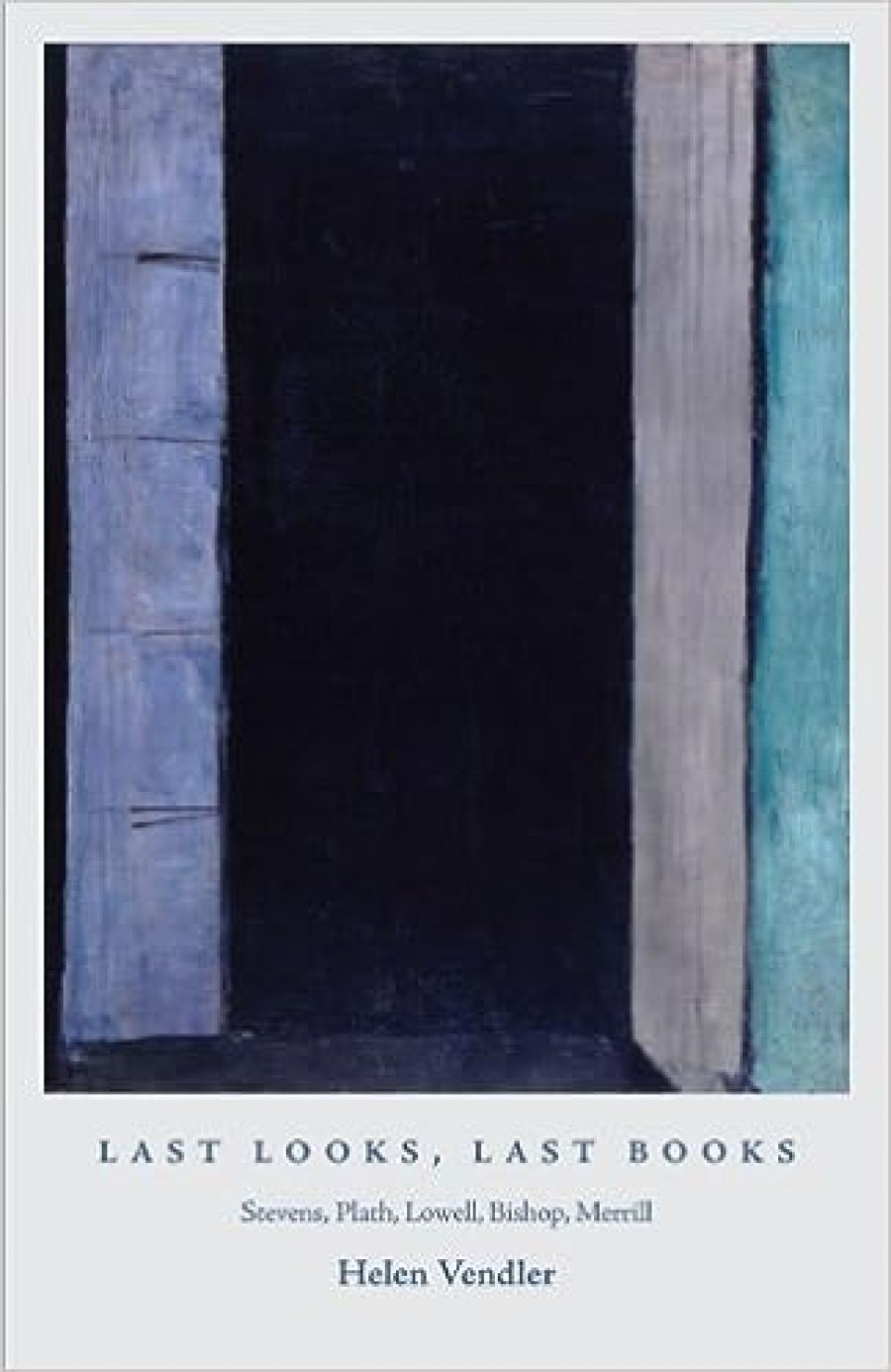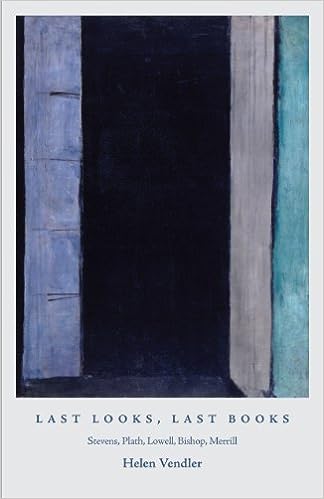
- Free Article: No
- Contents Category: Poetry
- Review Article: Yes
- Article Title: Binocular vision
- Article Subtitle: A brilliant undresser of poems
- Online Only: No
- Custom Highlight Text:
Helen Vendler, a supreme partridge among American critics of poetry, has written a third shining book on style – which she has made her métier, rather after Theodor Adorno, the philosopher-critic of music and the aesthetic high road. In her first, The Breaking of Style (1995), about Hopkins, Heaney, and Graham, she revealed how poets ‘can cast off an earlier style to perform an act of violence on the self’ – extending mastery. Coming of Age as a Poet (2003) was about the mature self-making of Milton, Keats, Eliot and Plath. Both books delivered the pleasures to which we have become accustomed: the feeling that we are in the company of a most brilliant undresser of poems, a critic who knows their stitching so well that she can lay their song and soul truly bare. Her powers of elucidation, with its enshrining of techne, have long brought joy to poets and their readers.
- Book 1 Title: Last Looks, Last Books
- Book 1 Subtitle: Stevens, Plath, Lowell, Bishop, Merrill
- Book 1 Biblio: Princeton University Press (Footprint Books), $29.95 hb, 152 pp
- Book 1 Cover Small (400 x 600):

The subject of this book, then, is what Vendler calls ‘“the problem of style” in a poem that wishes to be equally fair to both life and death at once’. The double quotes are Vendler’s and they hint at the driven schema of her project, just as they suggest the complex membranes of distinctions between what a poet, a poem and a critic might wish to seek out. What does it mean, in life and in art, to be ‘equally fair’ to life and death at once? Who needs it and wants it, and by what authority? If a Sunday school teacher shapes a book on the last texts of poets, a delicate sense of fairness might be at issue. But as Adorno remarked: ‘The maturity of late works of significant artists does not resemble the kind one finds in fruit … They are … not round, but furrowed, even ravaged. Devoid of sweetness, bitter and spiny, they do not surrender themselves to mere delectation.’ ‘In the history of art,’ he declared, ‘late works are the catastrophes.’
Vendler’s brilliant little book falls short of the catastrophes palpably present in the late works of two of her poets: Lowell and Plath. It is not that she doesn’t know the lives and tragic endings of these poets: of course she does. But she strains to find the poems that are fair to both life and to death. With Lowell, she has to cast back to his second last book (The Dolphin [1973] rather than the prosaically gutted Day by Day [1977]) to find a good example of what she wants. She wants to argue, of course, that Lowell had found an aesthetic, a late style, based on subtraction, which he had. But the poetic outcome was more often a registration of numb depletion than binocular vision. In one of his last poems, Lowell tried to find hope by saying that he wished his son’s life might work out better than his own:
Past fifty, we learn with surprise and a sense
of suicidal absolution
that what we intended and failed
could never have happened –
and must be done better.
This is a pathos that no stylistic device can amend. The same might be said of Plath’s trajectory of death. Vendler is wonderful in her account of Plath’s self-knowledge in this regard, along with the artistic work of ‘finding the courage of shutting up’, so as to be able to write the world objectively, as distinct from making poems that enacted a melodrama of her anguish, compulsively rooted in the spirals of the ‘I’. The poem where Plath’s work and the critic’s quest align is ‘Poppies in October’.
Even the sun-clouds this morning can not manage such skirts.
Nor the woman in the ambulance
whose red heart blooms through her coat so astoundingly –a gift, a love gift
utterly unasked for
by a sky …
Thus the binocular vision is displayed, Vendler claims; and goes on to affirm that, when the poem ends by ‘rhythmically’ turning itself inside out, ‘it ends on a note of gratitude’.
Well, maybe, but in the light of Plath’s actual end, I can’t help feeling that whatever Vendler says about Plath’s ‘newly objective’ style, the slow music of what happens in the last poems, as with Lowell’s, is closer to the existential negations of a late style, the creative deferrals and resistances (which Edward Said appreciated in Beethoven), than it is to any neat resolution of vision.
By contrast, the late works of Bishop and Merrill provide just what Dr Vendler has ordered: bejewelled examples of binocular vision. In Bishop’s case, an exquisite aesthetic control, evident in the tone and structural perfection of poem after poem, is at one with the poet’s personal stoicism. Dissecting Bishop’s ‘art of losing’, Vendler writes some of her best criticism: it is hard to imagine a greater match of sympathy between poet and critic – so much so that the critical project tends to fold into Vendler’s Puritan preferences as to how one should best manage catastrophes.
This does not happen with her dance with Merrill. The poet’s self-portraits are too various, too sharp and hard for the critic to slip into easy indulgences of the poet’s figures of speech: Merrill’s art keeps her out, so to speak. The result, as with the best responses to Bishop, is a surgical tracking of all that Merrill kept doing with the idea of form, its crystallisations and the incipient formlessness that he sought to defy in all manner of ways.
It is typical of Vendler, her depth, that she enables us to read the most erudite poets backwards. Merrill’s last book, A Scattering of Salts (1995), is a retuning of Tennyson’s In Memoriam (1850), where the evening star and the morning star are the same.
Fittingly, it is Wallace Stevens who begins this book. Stevens was the magnificent metaphysician of the sensual imagination, and his great last poems, published under the deceptively invincible title of The Rock (1954), tremble on several thresholds of catastrophe. Stevens hesitated to publish them because of that. Vendler’s role here is to draw our attention to the grandeur of the way the poems stay afloat, and sail on with such grace and weight among the stars. Of course, you have to read all of The Rock to get a sense of Stevens’s contra-Beethoven performance, but reading this book is also a marvellous place to start, as Vendler appraises the poet’s ‘lullabies in the midst of burial’.Morning star
evening star salt of the sky
First the grave dissolving into dawnthen the crucial recrystallising
from inmost depth of clear dark blue.


Comments powered by CComment